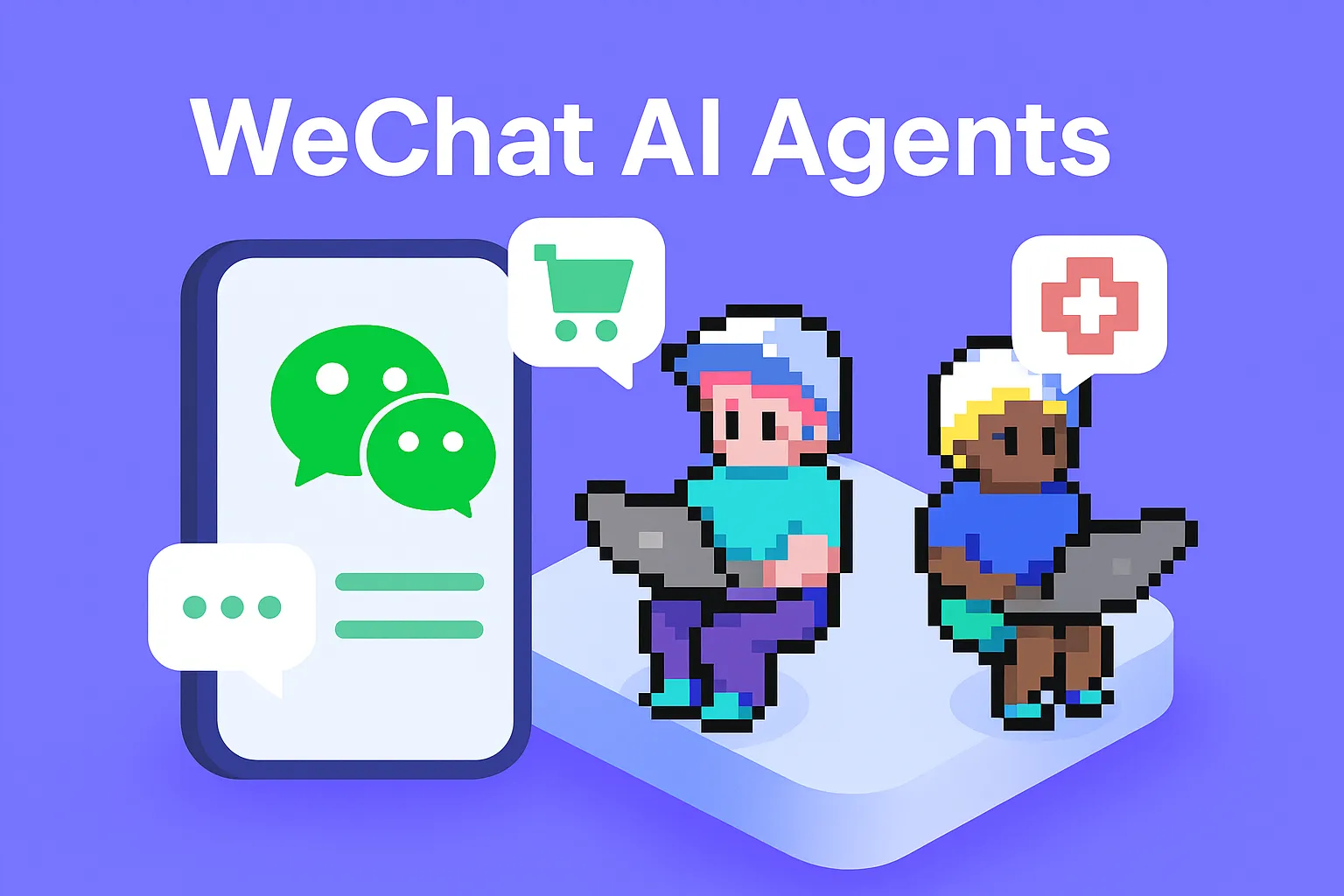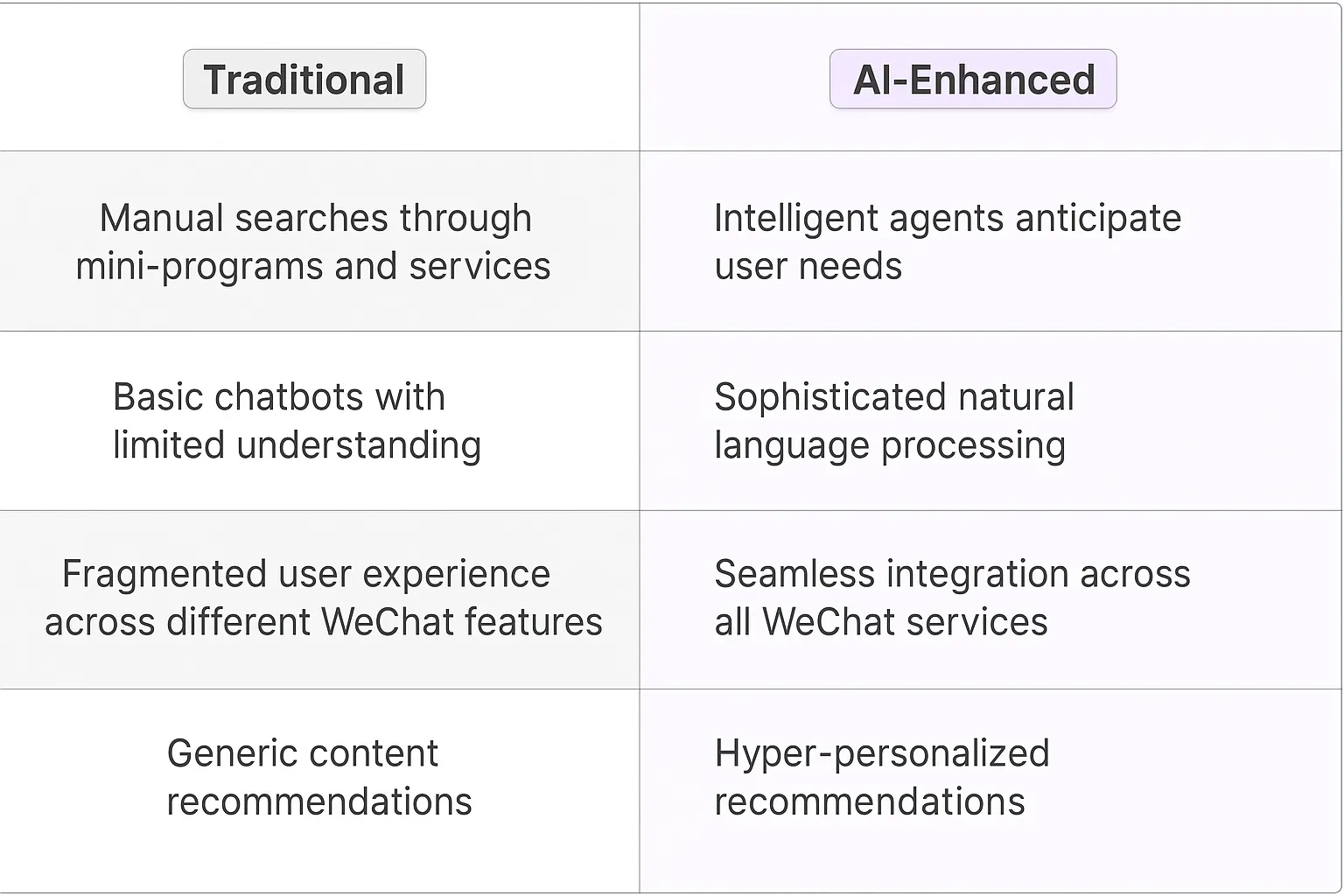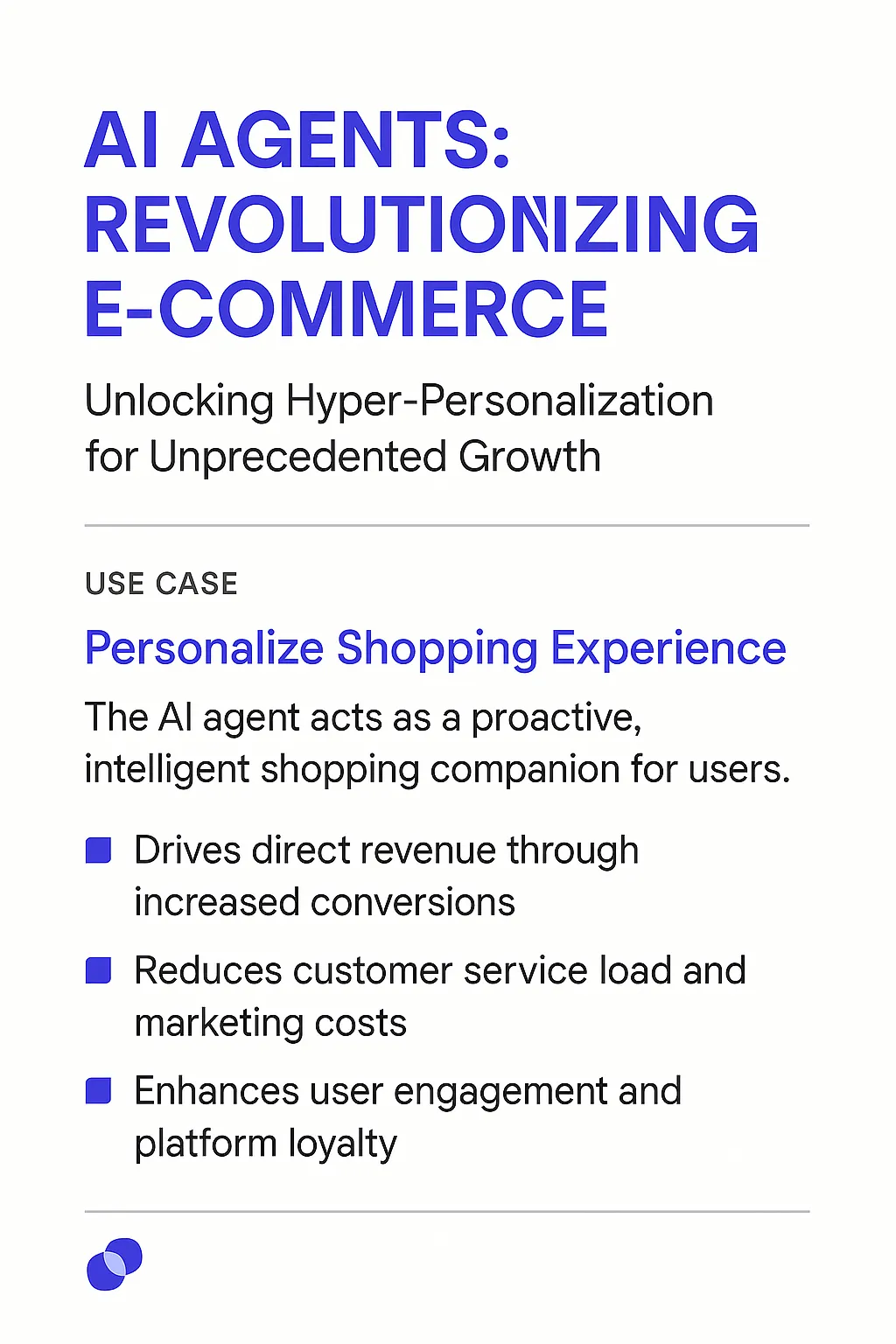WeChat AI Agents
WeChat: China's Super-App Powerhouse
WeChat is more than just a messaging app; it's a digital Swiss Army knife for over a billion users in China. Launched in 2011 by Tencent, WeChat has evolved into a comprehensive platform that integrates social networking, mobile payments, e-commerce, and a vast array of services through its mini-programs. It's the go-to app for everything from chatting with friends to paying bills, ordering food, and even accessing government services.
WeChat's power lies in its multifaceted functionality:1. Messaging: Text, voice, and video messaging form the core of WeChat's communication features.2. WeChat Pay: A ubiquitous mobile payment system used for everything from street vendors to luxury stores.3. Mini-programs: Lightweight apps within WeChat that provide services without leaving the platform.4. Official Accounts: Brands and content creators can establish a direct channel to users.5. Moments: A social feed where users share updates with their network.6. WeChat Work: An enterprise communication and collaboration tool integrated into the main app.These features create a closed-loop ecosystem where users can seamlessly navigate between social, commercial, and service-oriented activities. From customer service to social media management, WeChat provides a comprehensive platform for businesses and individuals alike.

Benefits of AI Agents for WeChat
Let's dive into the WeChat ecosystem and explore how AI agents are transforming the user experience. As someone who's been deep in the tech trenches, I've seen firsthand how these digital teammates are reshaping communication platforms.
What would have been used before AI Agents?
Before AI agents entered the chat, WeChat users relied on a mix of manual searches, saved contacts, and basic chatbots. It was like navigating a bustling Chinese market without a guide – overwhelming and often inefficient. Users had to sift through menus, remember specific commands, or bounce between different mini-programs to get things done. The cognitive load was real, and the user experience felt fragmented.
What are the benefits of AI Agents?
Now, with AI agents in the mix, WeChat is evolving into a hyper-intelligent ecosystem. These digital teammates are like having a local fixer who knows every nook and cranny of the platform. They're not just responding to queries; they're anticipating needs and connecting dots in ways that feel almost prescient.
First off, AI agents are crushing it in the personalization game. They're learning user preferences at a granular level, making recommendations that feel tailored rather than generic. Whether it's suggesting the perfect restaurant based on your chat history or cueing up a playlist that matches your mood, these agents are creating a bespoke WeChat experience for each user.
But it's not just about personalization – it's about integration. AI agents are breaking down the walls between WeChat's various services. They're seamlessly connecting conversations with transactions, content discovery with social sharing. This integration is reducing friction in user journeys, making the leap from chatting about a product to buying it feel natural and intuitive.
Language processing is another area where these agents shine. They're not just understanding text; they're grasping context, tone, and intent. This means more nuanced interactions, better translation services, and the ability to handle complex queries that would have stumped earlier chatbots.
Perhaps most importantly, AI agents are learning and improving in real-time. Each interaction makes them smarter, more attuned to user needs. It's like having a digital teammate that's constantly leveling up, bringing new skills and insights to every conversation.
The result? WeChat is becoming more than a super app – it's evolving into an intelligent companion that's deeply integrated into users' digital lives. As these AI agents continue to evolve, we're likely to see WeChat push the boundaries of what's possible in mobile ecosystems, setting new benchmarks for user engagement and platform stickiness.

Potential Use Cases of AI Agents with WeChat
Processes
WeChat, China's super-app, is ripe for AI agent integration. These digital teammates could revolutionize how users interact with the platform's vast ecosystem. Let's dive into some high-impact use cases that could reshape the WeChat experience:
- Personalized content curation: AI agents could analyze user behavior, preferences, and social connections to curate a tailored feed of articles, videos, and mini-programs. This would cut through the noise and deliver content that truly resonates with each user.
- Smart customer service: For WeChat's business accounts, AI agents could handle initial customer inquiries, route complex issues to human representatives, and provide 24/7 support. This would significantly reduce response times and improve customer satisfaction.
- Intelligent scheduling and reminders: By integrating with WeChat's calendar and messaging functions, AI agents could manage appointments, send reminders, and even suggest optimal meeting times based on participants' schedules.
Tasks
On a more granular level, AI agents could tackle specific tasks within WeChat:
- Language translation: Real-time translation of messages, voice calls, and even WeChat Moments posts, breaking down language barriers for WeChat's global user base.
- Smart money management: AI agents could analyze spending patterns within WeChat Pay, offer budgeting advice, and even automate bill payments or investments.
- Social media management: For influencers and businesses, AI agents could help schedule posts, analyze engagement metrics, and suggest content strategies to boost visibility on WeChat Moments.
- Mini-program discovery: AI agents could recommend relevant mini-programs based on user behavior and current context, increasing discoverability within WeChat's vast ecosystem.
The integration of AI agents into WeChat isn't just about adding features – it's about creating a more intuitive, personalized, and efficient user experience. As these digital teammates become more sophisticated, they'll likely become an indispensable part of the WeChat ecosystem, driving user engagement and opening up new possibilities for businesses and developers.
The key to success will be striking the right balance between automation and human touch. WeChat users value the platform's social nature, so AI agents should enhance, not replace, human interactions. As we move forward, we'll likely see a new paradigm emerge – one where AI and human intelligence work in tandem to create a truly next-level mobile experience.

Industry Use Cases
WeChat AI agents are reshaping how businesses operate across sectors. These digital teammates aren't just fancy chatbots; they're powerful tools that can transform entire workflows. Let's dive into some concrete examples of how different industries are leveraging WeChat AI to solve real problems and create tangible value.
From retail to healthcare, finance to education, WeChat's AI capabilities are being harnessed in ways that go beyond simple automation. These AI-powered solutions are tackling complex challenges, enhancing customer experiences, and unlocking new opportunities for growth and innovation. The following use cases illustrate how WeChat AI is making a significant impact across various industries, demonstrating its potential to drive meaningful change in how businesses operate and serve their customers through streamlined workflows.
WeChat AI Agents in E-commerce: Redefining Customer Experience
E-commerce is ripe for disruption, and WeChat AI Agents are poised to be the game-changers. These digital teammates aren't just glorified chatbots; they're sophisticated entities capable of transforming how businesses interact with customers on China's most popular super-app.
Consider a luxury fashion brand looking to penetrate the Chinese market. By deploying a WeChat AI Agent, they're not just setting up another sales channel – they're creating a personalized shopping companion for each customer. This agent doesn't just respond to queries; it proactively engages users based on their browsing history, purchase patterns, and even the latest fashion trends.
The AI can curate personalized lookbooks, suggest outfit combinations, and even provide styling advice tailored to the user's body type and preferences. It's like having a personal stylist in your pocket, available 24/7.
But here's where it gets interesting: these agents can also tap into WeChat's vast ecosystem. They can coordinate with local dry cleaning services for garment care, book appointments with in-store tailors for alterations, or even arrange for a fashion consultant to video call for a more personalized experience.
The real power lies in the agent's ability to learn and adapt. Each interaction refines its understanding of the customer, allowing for increasingly personalized recommendations and interactions. This isn't just about increasing sales; it's about fostering brand loyalty through hyper-personalized experiences that rival traditional customer service.
As these AI agents evolve, they'll become indispensable assets for e-commerce brands, blurring the lines between online and offline retail experiences. They're not just changing the game; they're rewriting the rules of customer engagement in the world's largest consumer market.
WeChat AI Agents in Healthcare: Transforming Patient Care in China
The healthcare industry in China is about to experience a seismic shift, and WeChat AI Agents are at the epicenter. These digital teammates are set to redefine how patients interact with healthcare providers, manage their health, and access medical information.
Let's dive into a concrete example: a major hospital in Shanghai implements a WeChat AI Agent to handle patient inquiries and appointments. This isn't your run-of-the-mill chatbot. It's a sophisticated system that understands medical terminology, can interpret symptoms, and has access to the patient's medical history.
When a patient messages the AI, it doesn't just book appointments. It conducts a preliminary assessment, asking relevant questions based on the symptoms described. Using natural language processing and machine learning algorithms, it can identify potential red flags and prioritize urgent cases.
But here's where it gets really interesting: the AI doesn't operate in isolation. It's integrated with the hospital's electronic health records system and can coordinate with other departments. Need a blood test before your appointment? The AI schedules it and sends you a QR code for easy check-in at the lab. The system can even handle complex appointment scheduling across multiple departments.
The AI also serves as a post-visit care coordinator. It sends medication reminders, tracks recovery progress, and can even interpret basic lab results, flagging any concerning values for the doctor's immediate attention.
What's truly powerful is the AI's ability to learn and improve over time. As it interacts with more patients and receives feedback from healthcare professionals, its diagnostic capabilities and patient communication skills continuously evolve.
This isn't just about efficiency; it's about expanding access to healthcare. In a country where quality medical resources are often concentrated in big cities, these AI agents can provide a level of medical guidance to rural areas that was previously unthinkable.
As these systems mature, we're looking at a future where AI becomes an integral part of the healthcare team, working alongside human professionals to provide more comprehensive, accessible, and personalized patient care. The potential for improving health outcomes and patient satisfaction in China's massive healthcare market is enormous.
Considerations and Challenges for WeChat AI Agents
Implementing AI agents for WeChat isn't just a matter of plugging in some code and watching the magic happen. It's a complex dance of technology, user experience, and cultural nuance. Let's dive into the nitty-gritty.
Technical Challenges
WeChat's ecosystem is a walled garden with its own set of rules. Developers need to navigate through a maze of API restrictions and platform-specific protocols. It's not uncommon to find yourself reverse-engineering WeChat's undocumented features just to get basic functionality working.
Natural language processing (NLP) for Chinese presents its own set of hurdles. The language's contextual nature and the prevalence of homonyms make accurate interpretation a Herculean task. You might think you've nailed it, only to realize your AI is confusing "马上" (right away) with "马上" (on a horse).
Operational Challenges
WeChat's user base is massive and diverse. Your AI agent needs to cater to everyone from tech-savvy millennials in Shanghai to rural farmers in Sichuan. This diversity demands a level of adaptability that most Western platforms don't require.
Content moderation is another minefield. China's regulatory environment is notoriously strict and ever-changing. Your AI needs to be smart enough to avoid politically sensitive topics while still being useful. It's like walking a tightrope while juggling flaming torches.
Cultural Considerations
WeChat isn't just an app; it's a lifestyle. Your AI agent needs to understand and respect Chinese social norms. For instance, the concept of "face" (面子) is crucial in Chinese culture. An AI that doesn't grasp this nuance could inadvertently offend users, turning a helpful tool into a PR nightmare.
The way Chinese users interact with technology also differs from Western norms. They expect a higher degree of personalization and are more open to AI-driven recommendations. Your agent needs to strike a balance between being helpful and not coming across as invasive.
Scaling and Performance
WeChat's user base is not just large; it's hyperactive. Your AI agent might need to handle millions of concurrent interactions during peak hours. This isn't just a matter of throwing more servers at the problem. You need sophisticated load balancing and caching strategies to maintain responsiveness.
Moreover, WeChat's mini-program environment has its own set of limitations. Your AI needs to be lean and mean, delivering maximum value within tight resource constraints. It's like trying to fit an elephant into a Mini Cooper – you need to be creative with your engineering.
Implementing an AI agent for WeChat is not for the faint of heart. It requires a deep understanding of both technology and culture, coupled with the agility to adapt to a rapidly changing landscape. But for those who can pull it off, the rewards are immense – you're not just building a tool; you're shaping the future of how millions interact with technology.
The Future of WeChat: AI Agents Reshaping China's Digital Landscape
The integration of AI agents into WeChat marks a pivotal moment in the evolution of China's digital landscape. These intelligent digital teammates are set to redefine user experiences, creating hyper-personalized, efficient, and intuitive interactions within the WeChat ecosystem. From revolutionizing e-commerce with AI stylists to transforming healthcare with intelligent patient care systems, the potential applications are vast and varied.However, the path to successful implementation is fraught with challenges. Developers must navigate complex technical hurdles, operational intricacies, and cultural nuances unique to the Chinese market. The key to success lies in striking a delicate balance between cutting-edge AI capabilities and the human touch that WeChat users value.As these AI agents continue to evolve and integrate more deeply into WeChat's fabric, we're likely to see a new paradigm emerge in mobile ecosystems. WeChat, already a super-app, is poised to become an intelligent companion deeply woven into users' digital lives. This transformation will not only set new benchmarks for user engagement and platform stickiness but also open up unprecedented opportunities for businesses to connect with and serve their customers.The future of WeChat with AI agents is not just about adding features; it's about creating a more intuitive, efficient, and personalized digital experience. As this technology matures, it will undoubtedly reshape how millions of users interact with technology, businesses, and each other in the world's largest consumer market. The WeChat of tomorrow, powered by sophisticated AI agents, will be more than an app – it will be an indispensable digital companion for navigating modern life in China, continuously learning from customer feedback to enhance the user experience.













